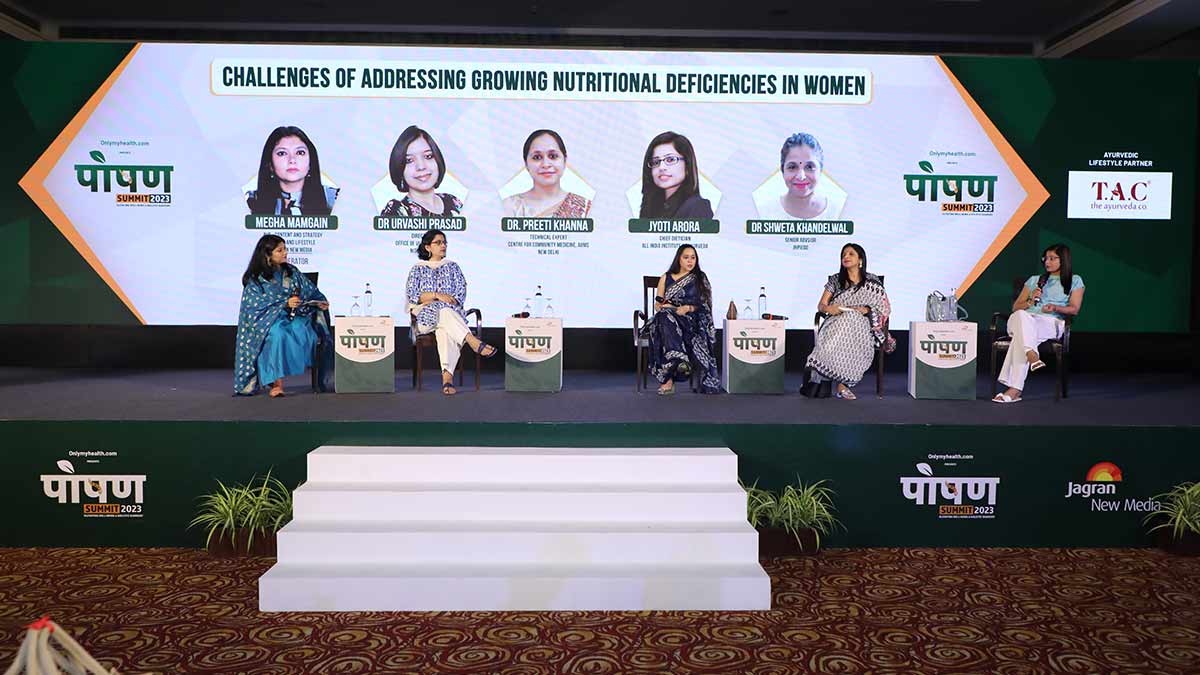
Women go through many physical challenges that can put them at risk of serious health disorders. From the risk of anaemia every month due to periods, to gestational diabetes, societal expectations of having impeccable skin and hair, and the mental health challenges posed by social stereotypes, women also face a heightened risk of poor mental health. One major tool that can help women combat most of these disorder are daily well-balanced meals that are consumed at the right time. Unfortunately, despite the abundant food choices available in today’s time, paradoxically an increasing number of women suffer from ‘hidden hunger,’ or a state of undernutrition despite adequate calorie intake.
To address the rising cases of malnutrition in women, OnlyMyHealth conducted a panel discussion titled, ‘Challenges Of Addressing Growing Nutritional Deficiencies In Women,’ at their Poshan Summit 2023, with State Partner The Government of Punjab, Ayurvedic Lifestyle Partner TAC- The Ayurveda Company, Hydration Partner Fast&Up, and Partner NVEDA.
Addressing Hidden Hunger In Indian Women

Moderating the panel, Megha Mamgain, AVP, Content and Strategy, Health and Lifestyle, Jagran New Media, initiated the discussion by pointing out the sinister nature of hidden hunger, as it does not induce any hunger pangs to make the person aware of their body’s need for food. “In India, the biggest victims of hidden hunger are women and children. Hidden hunger attacks the core of your health and well-being, as it refers to micronutrient deficiency.”
The panel included prominent names of the nutrient arena of the medical field, namely Dr Urvashi Prasad, Director, Office of Vice Chairman, Niti Ayog, Dr Preeti Khanna, Technical Expert, Centre for Community Medicine, AIIMS, New Delhi, Jyoti Arora, Chief Dietician, All India Institute of Ayurveda, and Dr Shweta Khandelwal, Senior Advisor, Jhpiego.
Also Read: National Nutrition Week: 7 Foods You Should Eat Daily
Mamgain kickstarted the discussion by asking Dr Khanna about the problem of anaemia among women and stating the findings of The National Family Health Survey which found that more than half of women and children in India are affected by anaemia.
“Anaemia is an unseen problem being witnessed in every socio-economic stratum. One of the biggest reasons for this is low-quality diets that tamper with the gut microbes that aid in the efficient absorption of iron,” replied Dr Khanna.
She added, “Another important reason and an upcoming area of research is the anaemia of inflammation. Inflammatory diets which are high in fat, sugar, and salt are a precursor for anaemia. To address the problem of anaemia in women, India needs policy modifications that encourage the consumption of the right food sources at the right time.
‘You Are What Your Mother Eats’
Bringing the panel’s attention towards the plight of women in many households, as they are the family members who eat the last and the least, Mamgain enquired whether the reason for women having a higher rate of nutritional deficiency could be such societal biases.
Also Read: What is Healthy Eating For Women? Here Is The Nutrition Guide
“This is a crucial point because usually we say ‘You are what you eat.’ But an interesting study by The International Food Policy Research Institute pointed out that ‘You are what your mother eats.’ Their research showed that mothers who were fed better had children with healthier birth weights and cognitive abilities,” informed Dr Khandelwal.
She shared the acronym ‘STREE’ to help everyone remember the crucial nutritional factors that can address the plight of women. “S stands for science, solidarity and solutions, T is for use of Technology, R is for their resilience and research, E stands for empowerment, education, and engagement, and lastly another E which represents an enabling environment that gives women the strength to understand that the dietary sacrifice they are making for their household is not a sacrifice since it is going to impact upto three generations that come after her.”
Ayurveda: The Indian Solution To Hidden Hunger

Talking about the ancient Indian science of Ayurveda and its power to alleviate malnutrition in women, Arora said, “To combat nutritional deficiencies, you really have to adopt a holistic approach. For example, to combat anaemia, vitamin C is equally important to enable iron absorption. Hence, eating only iron-rich foods is not enough to address iron deficiency, you need to have a meal that will boost your body’s ability to absorb essential micronutrients.”
Also Read: National Nutrition Week 2020: 6 Superfoods That Provide Micronutrients To Women
“Ayurveda’s definition of wholesome nutrition also includes providing a diet that considers Rasas and taste. The cell machinery has its own sensory receptors, which are triggered by a number of factors including the taste of the food. How your body absorbs nutrients is also dependent on its psychological functions, which are boosted by good-tasting food. Tasty food also helps combat environmental stress that also has implications on the way nutrients are absorbed in the body.”
Policy Interventions To Ensure Adequate Nutrition
Talking about the ways in which the government can help bridge the gap between women and their nutritional requirements, Dr Prasad shared, “The most important policy change should be to promote healthy diets through behaviour change. There should be ample focus on behavioural change at the community level by engaging with local communities, creating awareness in regional languages, and informing about recipes that are feasible as per their accessibility and affordability. To help the masses adopt healthy diets, you can’t preach one particular set of food items. You have to customise the recommendations based on the taste and dietary preferences of each region of India.”
“The government has also placed focus on various social determinants such as sanitation and drinking water, which can also make you repeatedly sick and drain your body of nutrition. We are also taking a life cycle approach to nutrition, in which we implement nutrition aid and awareness, as women in different phases of life have different nutrition requirements,” she added.
The panel concluded their discussion by agreeing that addressing hidden hunger in women requires a multifaceted approach that includes improving access to diverse nutritious food, promoting nutrition education, advocating for gender equality, and supporting policies that prioritise the nutritional needs of women. Recognising and addressing these challenges is essential to ensure that women receive the nutrition they need for a healthier future.







